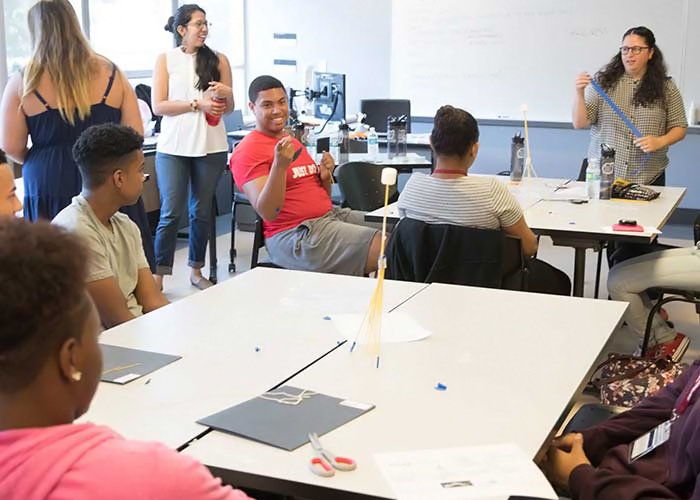“A Pipeline of Leadership” – RIC Partners with Boys & Girls Club
- News & Events
- News
- “A Pipeline of Leadership” – RIC Partners with Boys & Girls Club

This summer RIC President Frank D. Sánchez initiated a grant-funded partnership between RIC’s Youth Development Program and the Boys & Girls Club of Providence.
Titled Summer Learning, the program targeted and engaged three main players: elementary school students, high school students and Rhode Island College youth development majors (current students and alumni).
From July 2 through Aug. 9, 19 teaching apprentices, ages 16-18, employed by the Boys & Girls Club worked alongside a certified teacher and youth development professional, assisting elementary-age children in enrichment activities and academics. The curriculum included literacy and S.T.E.M. topics.
The teenage apprentices then came to Rhode Island College each Friday to take a youth development “mini course” taught by youth development majors and alumni of the program and led by RIC Youth Development Field Coordinator Rachael Clemons.
RIC became a practice space for leadership training for both the teenagers and RIC’s youth development students and alumni, said RIC Director of Youth Development Lesley Bogad, a co-principal investigator on the grant. Taking the leadership skills they learned at RIC, the apprentices then practiced on the elementary-age children back at the Boys & Girls Club, indirectly teaching the children leadership by modeling it themselves.
“It was a pipeline of leadership,” Bogad said. “We believe that the way the youth of Rhode Island will be best served in their growth as human beings, as students, as future workers and as community members is by being given lots of opportunities to practice leadership. We also believe that the more opportunities we have to rehearse a skill, the better we get at it.”

The mini course consisted of three components:
- The apprentices self-reflected on their teaching experiences at the Boys & Girls Club.
- They learned the concept of purposeful play; that is, as a teacher, they learned to always have a clear purpose or lesson that is being taught even through play.
- They honed leadership skills, specifically, how to have a constructive conversation around a problem or dilemma in the workplace, deal with children who are struggling with the expectations of their teacher or their expectations of themselves andbuild positive relationships with children.
And they participated in college-readiness activities.
Along with touring different buildings on campus each Friday to gain an understanding of college life, the apprentices met with Director of New Student Programs Michael Fox, who spoke to them about pathways to college and had them create their own vision board.
RIC Vice President of Student Success Jason Meriwether, a co-principal investigator on the grant, also met with and talked to the highschoolers about the value of a college education.
“The purpose of a degree goes beyond making money and achieving social mobility,” he said. “Education creates an opportunity for you to make significant social impact and change. It goes back to the mission of Rhode Island College to shape the economy of the state, to develop the talent in the state and to influence the future leaders of the state so that they will not just assume positions of power and leadership in Rhode Island but that they will make sure that lifting others up is a part of their story.”
RIC has a vested interest in extending teaching and learning beyond its borders into the Greater Rhode Island community becauseRIC’s president recognizes that when schools and community groups band together, learners achieve much more.
“The Boys and Girls Club of Providence for years has been doing outstanding work to support, encourage and mentor the next generation of Rhode Islanders,” Sánchez said. “Rhode Island College shares this mission to educate and provide learning opportunities for students in our state. This partnership will further solidify RIC’s role in the broader Providence community.”
